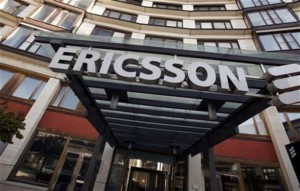 Ericsson said on Monday it had signed a cross- licensing deal with Samsung Electronics Co, ending a long-running patent dispute and boosting fourth-quarter sales by 4.2 billion crowns.
Ericsson said on Monday it had signed a cross- licensing deal with Samsung Electronics Co, ending a long-running patent dispute and boosting fourth-quarter sales by 4.2 billion crowns.
The world’s biggest maker of mobile network equipment sued Samsung late in 2012 claiming the Korean firm had infringed its patents. Samsung, which makes Galaxy smartphones and is increasingly active in network equipment, later made a counter claim.
Ericsson said on Monday the agreement included an initial payment and royalty payments from Samsung for the term of the multi-year license agreement and would increase Ericsson’s operating cash flow at the beginning of 2014.
Ericsson said the settlement would lift fourth-quarter sales by 4.2 billion Swedish crowns and net income by 3.3 billion Swedish crowns.
Ericsson shares were up 2.7 percent in early trade at 77.10 crowns, outperforming a 0.4 percent rise in European technology stocks.
“This agreement allows us to continue to focus on bringing new technology to the global market and provides an incentive to other innovators to share their own ideas,” said Kasim Alfalahi, Ericsson’s Chief Intellectual Property Officer.
Alfalahi would not say how long the agreement with Samsung was valid but said patent agreements generally cover four to seven years.
Ericsson, which invests around 30 billion crowns annually in research and development, did not reveal any further details of the agreement.
Patent infringement suits have become frequent in high-tech industries like telecoms in recent years.
While equipment such as handsets share much of their technology, forcing rivals to take out licenses from one another, companies are also desperate to protect any advantages they have and maximise incomes that are under pressure from fierce competition, leaving plenty of room for dispute.
Samsung is also embroiled in a legal war with Apple in multiple countries, with Apple alleging various Samsung smartphone and tablet products infringed its patents.
Ericsson has over 33,000 patents covering key technology for 2G, 3G and 4G networks and handsets. It has more than 100 license agreements with major players in the industry.
Source-NDTV





